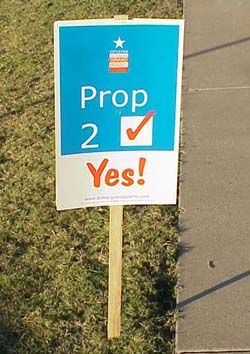| ||||
| | | |||
 | ||||
| Editor’s Note: This was written before the citizens of Grand Prairie defeated the bond issue on November 2. We think it raises valid points for future track construction consideration. In some ways, I admit that I'm probably not a model citizen. I regularly exceed the posted speed limit. I change lanes without signaling. I tear the "do not remove" tags off pillows. To avoid jury duty, I babble, drool and admit to every bias known to mankind. Worst of all, in 37 years of eligibility, I never have voted in a presidential election, a senatorial election, a school board election, not even an election for County Clerk. Nevertheless, despite criticisms from family, friends and foes alike, I have few regrets. However, there is an upcoming election in which I have a personal interest and, if allowed to vote, I would do so. Really. I'd do it. I'd march right down to wherever and exercise my inalienable right.
If on Nov. 2 the citizens of Grand Prairie favor Proposition 2, it will forever change the motor racing landscape because it will alter the manner in which racetracks are perceived and constructed. Personally, I never have favored taxpayer funding of sports arenas. However, taxpayer-built stadiums are a reality from Dallas to Denver and Seattle to Charlotte. And if taxpayers are going to build stadiums for NFL football teams, NBA basketball teams, Major League baseball teams and NHL hockey teams, why wouldn't they fund arenas for NASCAR stock car racing, open wheel racing and NHRA drag racing? In fact, if economic impact is the determining factor, I would dare say that spectators attending motor racing events leave a lot more cash in the market than those who breeze into town for a weekend football game. Whether you agree or disagree with the taxpayer funding issue, the bottom line is that motor racing no longer is a stepchild in the entertainment marketplace and for what it delivers in jobs and economic benefits it should be afforded the same considerations as the more traditional stick-and-ball sports. The brainchild of Billy Meyer, who in 1986 created a major revolution in drag racing with the opening of the original Texas Motorplex at Ennis, the new Texas Motorplex at Grand Prairie will be more entertainment complex and less dragstrip. Plans call for a horseshoe-shaped stadium (a la Route 66 Raceway in Chicago) seating 60,000 for drag racing and around 40,000 for concerts. That would make it the largest capacity track in straight-line racing. But there's more. Meyer also is planning 60 luxury suites, a private club, a community center and, in addition to the usual fast food fare, a full-service restaurant, on-site. In the Motorplex tradition, the new track would be all-concrete — but with a unique twist. It would have temperature controlling coils imbedded within that would allow the surface temperature to be controlled. As is the case with many of the traditional stadiums and arenas, the city of Grand Prairie would own the track. It would lease it back to Meyer for a minimum of 30 years. There has been organized opposition to the project , some of it an outgrowth of Bruton Smith's cleverly-timed announcement that he will build a dragstrip on the grounds of Texas Motor Speedway north of Fort Worth without any taxpayer help. Realistically, though, Smith's project makes little economic sense especially now that the NHRA has flat out said that, by contract, it cannot award a Smith track a national event date as long as Meyer is operating a track in the Dallas-Fort Worth area, either in Ennis or Grand Prairie. Meyer's plan for the Texas Motorplex at Grand Prairie is a revolutionary one. So was his plan to build the original Motorplex. I'm convinced that, based on his past record (notwithstanding his brief but disastrous tenure as owner of the IHRA), he can make this thing work, not just for himself but for a sport which, right now, could really use a boost. Unfortunately, I'm not the guy he needs to convince.
photos by Jeff Burk
| ||||
|
Copyright 1999-2001, Drag Racing Online and Racing Net Source | ||||
 Unfortunately, since I am not a citizen of Grand Prairie, Texas, I am ineligible to offer my "thumbs-up" or "thumbs-down" to Proposition 2, the quarter-cent sales tax that would fund $50.5 million of the projected $64-70 million cost of the new Texas Motorplex at Grand Prairie.
Unfortunately, since I am not a citizen of Grand Prairie, Texas, I am ineligible to offer my "thumbs-up" or "thumbs-down" to Proposition 2, the quarter-cent sales tax that would fund $50.5 million of the projected $64-70 million cost of the new Texas Motorplex at Grand Prairie.